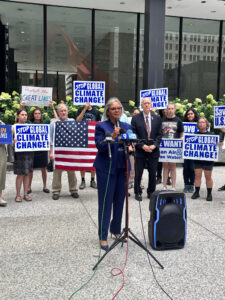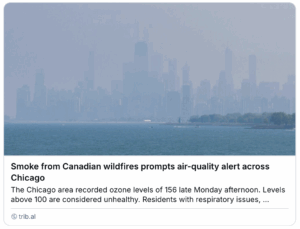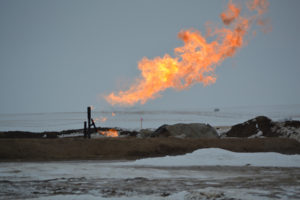August 01, 2025
Endangering the Midwest: Trump EPA Strikes at the Heart of Climate Change Protections
Denying a problem doesn’t make it go away, dismantling our ability to fight it will make the problem worse
By Susan Mudd, Senior Policy Advocate
This week, the Trump EPA decided to revoke its own ability to regulate greenhouse gas emissions by rescinding the endangerment finding. The scientific consensus has been clear for decades: greenhouse gases fuel climate change which puts people in danger. EPA is trying to reject that basic reality, a move that is scientifically AND legally indefensible, and flies in the face of common sense. EPA has literally one job: to protect human health and the environment, but this administration is throwing all that out the window.

Congresswoman Kelly
I spoke at a rally earlier this week to raise the alarm. Convened by members of the American Federation of Government Employees Local 704, which represents EPA workers in the Midwest, the rally included Congressman Bill Foster, Congresswoman Robin Kelly, Metropolitan Water Reclamation District Commissioner Cam Davis, and environmental advocates including members of the Sierra Club and Respiratory Health Association.
As Congresswoman Kelly put it “the future belongs to our children and grandchildren. President Trump is trying to take that future away, but I’m committed to ensuring the next generation inherits a world with clean air and water.” We stand with the Congresswoman and millions of Americans in continuing the fight for a cleaner, healthier future.
Here are some highlights from my remarks on what this all means for Midwesterners, and some ways you can take action to push back and continue the fight for climate solutions.
The Midwest is Already Being Impacted by Climate Change
Earlier this month ELPC released an updated “Assessment of the Impacts of Climate Change on the Great Lakes” by over a dozen leading university and research scientists. The study, led by a professor of atmospheric science from the University of Illinois – Urbana-Champaign Don Wuebbles (who has led international and national climate assessments), found our region is already experiencing more extreme weather, more precipitation, and more dangerous heat. What do these findings mean for Great Lakes residents?
-

News headlines this week highlight how dangerous wildfire smoke is affecting Midwestern air quality
Here in Chicago and across the Midwest, we’ll see more summer days with temperatures over 90 degrees Fahrenheit AND higher electricity bills.
- Already the number of tick species and tick-borne diseases are on the rise —impacting kids’ summers, campers, walkers, and hikers.
- Wildfire smoke is back in the Midwest, just like last summer. We can expect more, harming health and limiting people’s ability to safely be outside.
- Iowa, Indiana, and Illinois farmers can expect wetter springs to delay planting, then summer droughts threatening crops’ viability, damaging our food supply and rural economies.
- More fluctuation in lake levels and flash flooding, like the south suburbs of Chicago just experienced in the last few days, and is predicted now along the Mississippi River, damaging basements and ruining businesses.
 Toledoans and other Lake Erie residents can expect harmful algal blooms starting earlier and lasting longer, threatening both their drinking water and their chance to swim on hot summer days.
Toledoans and other Lake Erie residents can expect harmful algal blooms starting earlier and lasting longer, threatening both their drinking water and their chance to swim on hot summer days.- Less ice cover leads to the decline of white fish AND Wisconsin brown and brook trout fishermen can expect increasing temps to reduce those prize fish habitats.
EPA cutting off its own ability to act will make it even harder to protect our health, environment, and economy. Denying a problem doesn’t make it go away; dismantling the ability to fight it makes the problem even worse.
A Multifaceted Attack on Climate Solutions
The announcement to undo the endangerment finding was big news this week, but it was unfortunately not alone. Here are a few ways that this administration is exacerbating climate change problems, and ways that you can fight back.
Endangerment Finding & Clean Cars/Trucks – America’s climate regulations are built on the fundamental reality that climate pollution is dangerous to public health (“endangerment”). By rejecting that reality, the EPA would have no legal basis to regulate greenhouse gases, such as the standards for cleaner light- medium- and heavy-duty vehicles. For many years, federal rules have required carmakers to reduce the pollution that comes out of tailpipes to save us money while improving our air. Obliterating these standards will mean dirtier cars and higher prices at the pump for all of us. It will also mean more air pollution and make it harder for cities and states to clean up the air. ELPC will be creating an easy form to submit public comments by September 19th, so sign up for our email list to get alerted as soon as it becomes available.

Gas flare in North Dakota
Methane Emissions – While carbon dioxide is the most abundant greenhouse gas, methane is the most potent, with 80 times the warming potential of CO2. So, everything we do to rein in methane pollution has a big impact for a cleaner, healthier planet. Unfortunately, the Trump EPA is delaying implementing the 2024 methane standards for the oil and gas industry, meaning more dangerous pollution in the air and wasted energy from oil and gas leaks, venting, and flaring. This week, ELPC joined 11 health, environmental, and community groups in filing a lawsuit challenging the EPA for its delay.
Greenhouse Gases from Power Plants – EPA is also proposing to repeal critical federal standards that limit greenhouse gas pollution from fossil fuel power plants. These plants are ground zero for U.S. climate pollution. They are the second-largest source of greenhouse gas emissions in the country, and many of the dirtiest plants are located in the Midwest. The EPA has a responsibility to protect people, not polluters. Submit your public comment today. Tell EPA to keep strong climate pollution limits in place for fossil fuel-fired power plants. Our health and future depend on it.
It’s time to ramp UP efforts to reduce the air pollution that is leading to all of this damage, NOT time to put heads in the sand, deny the obvious, and exacerbate the problems. EPA must get back to addressing the impacts and saving human health, our environment and economy.

